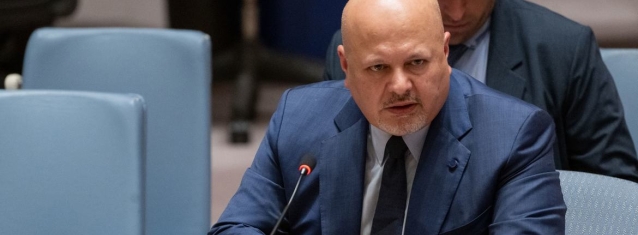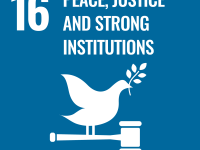News
ICC INVESTIGATION INTO DARFUR VIOLENCE: ACCOUNTABILITY FOR WAR CRIMES
AND CRIMES AGAINST HUMANITY

Karim Khan, ICC Prosecutor briefing the UNSC (Source: UN Photo/Eskinder Debebe)
ARAC International Strategic Communications -
Description: The International Criminal Court (ICC) launches an investigation into the surging violence in Darfur, seeking accountability for war crimes and crimes against humanity. Stay updated on the latest developments and efforts to bring justice to the victims.
Analysis:
The International Criminal Court (ICC) has launched an investigation into allegations of war crimes and crimes against humanity in the Darfur region of Sudan. This follows the recent killings of 87 members of the ethnic Masalit community, reportedly carried out by the Rapid Security Forces and its militia. The ICC Prosecutor, Karim Khan, briefed the Security Council and emphasized the ongoing mandate of the ICC to investigate crimes within its jurisdiction, including genocide, crimes against humanity, and war crimes. Khan called for accountability and fair trials for individuals involved in these crimes.Importance of International Cooperation:
The ICC Prosecutor urged the Security Council to converge around the principles of the UN Charter, the obligations under the Rome Statute, and the authority of the Council itself. The violence in Darfur and Sudan as a whole has been recognized as a threat to international peace and security. The Prosecutor emphasized that individuals who aid, abet, encourage, or direct crimes from outside Sudan that may be committed in Darfur will also be investigated.Focus on Crimes Against Children and Gender-Based Violence:
The ICC Prosecutor has given clear instructions to prioritize crimes against children and crimes of sexual and gender-based violence. This demonstrates the commitment of the ICC to address the most vulnerable victims and ensure that justice is felt and experienced by those affected by these crimes. A secure online portal has been established to encourage individuals to submit information or allegations of crimes and rights violations.Upholding International Humanitarian Law:
The ICC Prosecutor called on the warring factions in Sudan to uphold their obligations under international humanitarian law and protect civilians. It is crucial for all parties involved in the conflict to recognize the importance of adhering to these laws, even at this stage, to prevent further violence and protect the rights of civilians.Update on Cases:
The ICC Prosecutor provided an update on ongoing cases, including the trial of senior Janjaweed militia leader Ali Muhammad Ali Abd-Al-Rahman and the cases of former president Omar Al Bashir, Ahmad Muhammad Harun, and Abdel Raheem Muhammed Hussein. The report highlighted the escalating situation of violent hostilities and the challenges faced in pursuing justice and accountability in Sudan's current state. The Office of the Prosecutor is engaging with relevant partners regarding outstanding arrest warrants, considering the ongoing hostilities between the national army and the RSF militia.Update on Cases:
The ICC Prosecutor provided an update on ongoing cases, including the trial of senior Janjaweed militia leader Ali Muhammad Ali Abd-Al-Rahman and the cases of former president Omar Al Bashir, Ahmad Muhammad Harun, and Abdel Raheem Muhammed Hussein. The report highlighted the escalating situation of violent hostilities and the challenges faced in pursuing justice and accountability in Sudan's current state. The Office of the Prosecutor is engaging with relevant partners regarding outstanding arrest warrants, considering the ongoing hostilities between the national army and the RSF militia.Conclusion:
The ICC's investigation into the surging violence in Darfur sends a strong message that perpetrators of war crimes and crimes against humanity will be held accountable. The international community must support the ICC's efforts and ensure cooperation to promote justice, protect civilians, and uphold international humanitarian law. The ongoing conflicts in Sudan demand urgent attention and efforts to bring an end to the violence and establish a path toward sustainable peace and stability.Recommendations:
1. Strengthen Accountability Mechanisms: It is essential for the international community to support and strengthen accountability mechanisms, including the International Criminal Court (ICC), to ensure that perpetrators of war crimes and crimes against humanity in conflict-affected areas, such as Darfur, are held accountable. This includes providing necessary resources, expertise, and political support to the ICC to carry out its investigations and prosecutions effectively.2. Increase Diplomatic Engagement: Diplomatic efforts should be intensified to bring all relevant parties to the negotiating table and facilitate peaceful dialogue. The international community, including regional organizations, should actively engage with Sudanese authorities, armed groups, and civil society to encourage meaningful dialogue and find peaceful solutions to the ongoing conflicts.
3. Enhance Protection of Civilians: The protection of civilians should be prioritized in conflict-affected areas, particularly in Darfur. International actors should work closely with Sudanese authorities to ensure the safety and well-being of vulnerable populations, including women, children, and internally displaced persons. Adequate resources and support should be provided for humanitarian organizations to deliver essential services and protection to those in need.
4. Support Peacebuilding and Reconciliation: Sustainable peace in Sudan requires long-term investment in peacebuilding and reconciliation efforts. The international community should provide support for initiatives that promote intercommunal dialogue, reconciliation, and the strengthening of social cohesion. This includes supporting grassroots organizations and civil society actors who play a crucial role in promoting peace at the local level.
4. Support Peacebuilding and Reconciliation: Sustainable peace in Sudan requires long-term investment in peacebuilding and reconciliation efforts. The international community should provide support for initiatives that promote intercommunal dialogue, reconciliation, and the strengthening of social cohesion. This includes supporting grassroots organizations and civil society actors who play a crucial role in promoting peace at the local level.
5. Advance Sustainable Development Goal 16: Supporting and implementing Sustainable Development Goal 16 (SDG 16) is crucial for fostering peace, justice, and strong institutions in Sudan. Efforts should be directed towards strengthening governance, promoting the rule of law, ensuring access to justice, and building accountable institutions. Collaboration between the government, civil society, and international partners is essential to achieve the targets set under SDG 16.
6. Promote Regional Cooperation: Regional cooperation and collaboration are critical for addressing the complex security challenges in the region. The international community should encourage and support regional initiatives aimed at promoting peace, stability, and security in Sudan and its neighboring countries. This includes enhancing coordination and information-sharing mechanisms to effectively respond to cross-border threats and promote regional peace and security.
6. Promote Regional Cooperation: Regional cooperation and collaboration are critical for addressing the complex security challenges in the region. The international community should encourage and support regional initiatives aimed at promoting peace, stability, and security in Sudan and its neighboring countries. This includes enhancing coordination and information-sharing mechanisms to effectively respond to cross-border threats and promote regional peace and security.
7. Address Root Causes of Conflict: It is crucial to address the underlying causes of conflict in Sudan, including issues related to governance, inequality, land disputes, and access to resources. Efforts should be directed towards promoting inclusive governance, equitable resource distribution, and addressing grievances to create an environment conducive to sustainable peace.
By implementing these recommendations, the international community can contribute to the promotion of peace, justice, and security in Sudan, particularly in conflict-affected areas like Darfur. Collaboration and sustained commitment from all stakeholders are essential to achieving long-lasting peace and stability in the region.
By implementing these recommendations, the international community can contribute to the promotion of peace, justice, and security in Sudan, particularly in conflict-affected areas like Darfur. Collaboration and sustained commitment from all stakeholders are essential to achieving long-lasting peace and stability in the region.
more information: https://www.arac-international.org/2023/07/icc-investigation-darfur-violence-accountability.html
Liability for this article lies with the author, who also holds the copyright. Editorial content from USPA may be quoted on other websites as long as the quote comprises no more than 5% of the entire text, is marked as such and the source is named (via hyperlink).






